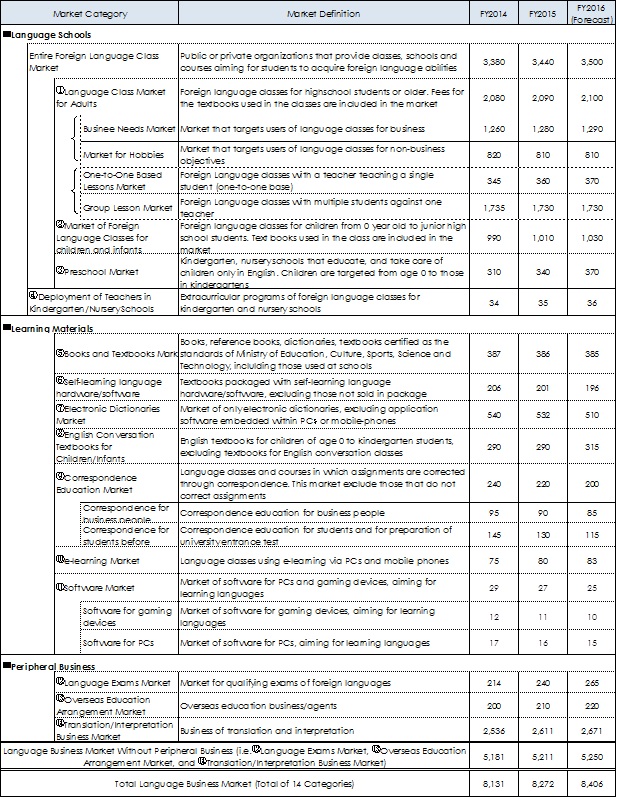Language Business Market in Japan: Key Research Findings 2016
Research Outline
1. Research period: March to June, 2016
2. Research target: Foreign language schools, publishers of language education materials, manufacturers of electronic dictionaries, software makers, businesses of e-learning, correspondence education, language study materials, overseas-education arrangement, and interpretation/translation, and companies and organization operating qualification exams.
3. Research methodologies: Face-to-face interviews by the specialized researchers, surveys via telephone/FAX, and literature research
<What is language business market?>
Language business market in this research indicates the following 14 categories of foreign language class markets: 1) Foreign language classes for adults, 2) Foreign language classes for children/infants, 3) Pre-schools, 4) Deployment of teachers to kindergarten/day-care centers for children, 5) Textbooks, 6) Self-learning language hardware/software, 7) Electronic dictionaries, 8)Textbooks of English conversation classes for children/infants, 9) Correspondence education, 10) E-learning, 11) Software, 12) Language exams, 13) Overseas-education arrangement, 14) Interpretation/translation business. Note that markets of language exams, overseas-education arrangement, and interpretation/translation business are defined here as language “peripheral business.”
Summary of Research Findings
- Language Business Market for FY2015 Achieved 827.2 Billion Yen, 101.7% of Size of Preceding Year
Size of language business market (total of 14 categories) for FY2015 rose to 827.2 billion yen, 101.7% of that of the preceding fiscal year, based on the sales of the businesses.
From the previous fiscal year, those services for children continued being prosperous (i.e., those services including Foreign language classes for children/infants, Preschools, and Deployment of teachers to kindergarten/day-care centers for children). In addition, the peripheral markets, such as translation/interpretation business and language exams, have also been stable.
- Expanding Translation Needs Stemming from Business Globalization
Progressive globalization in business has expanded the translation needs at various industries and sectors, especially those demands from Japanese to English and from various languages to Japanese. At large translation companies, translation demands regarding manufacturing, patent/intellectual property, medical (medicines/pharmaceuticals), finance, IT/correspondence, legal/IR are on the rise. IR-related cases are particularly increasing, because equal and fair disclosure of information on listed companies is required by foreign investors.
- Language Business Market in FY2016 Projected to Achieve 840.6 Billion Yen, 101.6% on Y-o-Y Basis
The entire language business market (total of 14 categories) for FY2016 is projected to achieve 840.6 billion yen, 101.6% of the size of the preceding year. As English becoming the required subject at elementary schools, the future of the language business market is likely to remain robust, with continuous favorable sales expected for the services for children including foreign language classes for children/infants, pre-schools, deployment of teachers to kindergarten/day-care centers for children, and textbooks of English conversation classes for children/infants.
- Transition of Size of Language Business Market by Category
